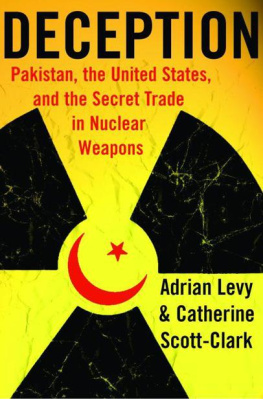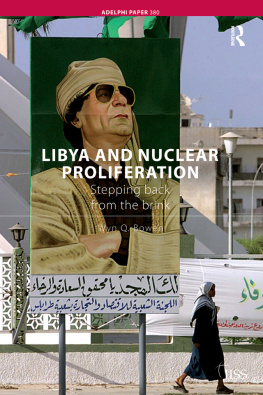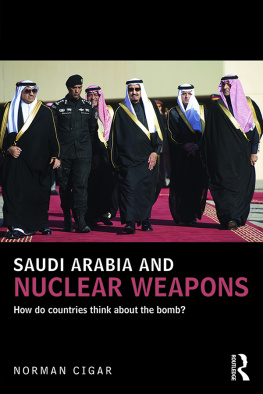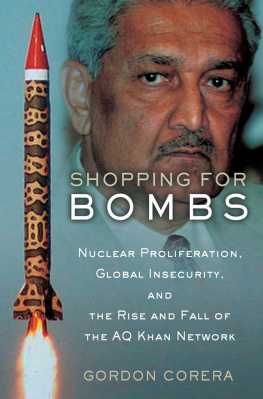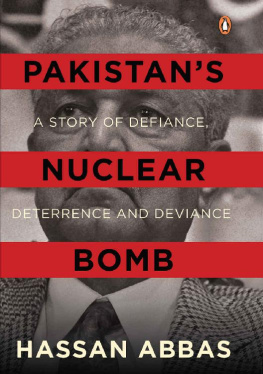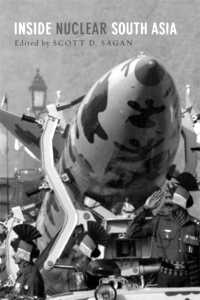Adrian Levy &
Catherine Scott-Clark
DECEPTION
PAKISTAN, THE UNITED STATES,
AND THE SECRET TRADE
IN NUCLEAR WEAPONS

Walker & Company
New York
For DEL
16 November 194031 December 2005
CONTENTS





This is a story of how our elected representatives have conjured a grand deception, the terrible consequences of which may not become clear for decades to come. It is a chronicle of moral lapses, abysmal judgments, failures of oversight, careless and frequently lazy analyses of the changing world around us which have served to further destabilize it and to empower those bent on global jihad.
The deception was first glimpsed in 2004 when the government of Pakistan announced that its most revered scientist, Dr. Abdul Qadeer Khan, was to make a confession live on Pakistan TV. Dr. Khan, a figure normally cloaked in intrigue, having been associated with Pakistans covert nuclear program for three decades, appeared on 4 February, speaking in English for the benefit of the wider world, rather than in Urdu for a home audience that would normally cling to his every word.
My dear brothers and sisters, Khan began, before admitting to what he described as unauthorized proliferation activities. Khan signed off: May Allah keep Pakistan safe and secure. Long live Pakistan! To ensure that what he had done was fully understood in the West, the Pakistan military conducted explanatory briefings in which Khan was said to have run, pretty much on his own, a black market in nuclear weapons technology for client states that President George W. Bush had identified as the Axis of EvilIran, Libya and North Korea.
The ramifications were appalling. There was heated conjecture around the world about why Khan, caricatured as the Typhoid Mary of nuclear proliferation, had done itout of political and religious conviction, or for self-aggrandizement? Editorials speculated for whom Khan had done itthe rogue regimes themselves, jihadis in Afghanistan, Osama bin Laden, or perhaps terrorist cells hoping to let off a nuclear device in Europe or America.
President George W. Bush subscribed to the deceit, announcing several days later: Khan has confessed his crimes and his top associates are out of business. Khan and a small band were guilty of shocking offenses, but there was no need to put them on trial. Bush explained: President Musharraf has promised to share all the information he learns about the Khan network, and has assured us that his country will never again be a source of proliferation. Pakistan was so on top of the situation that there would be no need to extradite the scientists to the West.
In reality, Khans confession was a ruse. It takes more than one person to make a mess of this proportion. Khan was the fall guy and his performance papered over the true nature of what many now believe was the nuclear crime of all our lifetimes and undoubtedly the source of our future wars. The nuclear bazaar Khan claimed to have orchestrated certainly existed, but where the public and private stories diverged was that the covert trade in doomsday technology was not the work of one man, but the foreign policy of a nation, plotted and supervised by Pakistans ruling military clique, supposedly a key ally in Americas war on terror. The true scandal was how the trade and the Pakistan militarys role in it had been discovered by high-ranking US and European officials, many years before, but rather than interdict it they had worked hard to cover it up.
For three decades, consecutive US administrations, Republican and Democrat, as well as the governments in Britain and other European countries, had allowed Pakistan to acquire highly restricted nuclear technology. In a disastrous epoch, key state assets were then misdirected and countermanded in order to disguise how Pakistan had sold it on. Intelligence gathering in the US was blunted while federal agencies, including the Departments of State and Defense, were corralled into backing the White House agenda and forced to sidestep Congress and break federal laws. Officials who tried to stop the charade were rough-housed, smeared or purged, inflicting terrible damage on America and Europes ability to see sharply. The US Congress played along too, by folding beneath White House pressure during a period in which political debate that dared level hard questions was portrayed as unpatriotic or even seditious.
The question all of this begged was why anyone would want to place the survival of a military regime in Pakistan above the long-term safety of the world.
Perhaps the only truthful statement on 4 February 2004 was one made inadvertently. Richard Boucher, the US State Department spokesman, characterized the Khan affair as having been a tough call for Pakistans dictator-president, General Pervez Musharraf. Khan was a national hero and mention of his name in Pakistan was sufficient to make citizens bristle with pride. Having furnished a nation incapable of manufacturing sharp sewing needles, as Khan liked to put it, with a cutting-edge production line for nuclear weapons able to strike almost every city in India, Pakistans habitual enemy, Khan had become popularly known as the Father of the Bomb.
Few people in Pakistan knew that he had become involved in the covert program by accident. While working as a technical translator in Holland in 1972, Khan had read highly classified blueprints for a radical new technique being trialled by a consortium of British, Dutch and German scientists, a breakthrough that would enable them to create fissile material by spinning a derivative of uranium at extraordinary speeds in a centrifuge that resembled a large, upturned cigar case. A savvy Khan had immediately appreciated that the true value of this secret technology lay in a paradox. While the process was classified and revolutionary, its components were commonplace and could be imported by Islamabad under the wire, with little chance of anyone tipping off the International Atomic Energy Agency (IAEA), the global nuclear police, based in Vienna, Austria.
In 1975 Khan returned to Islamabad with three suitcases crammed full of stolen information. The following year, Pakistans agents began shopping in Europe and North America for the equipment the country needed, a process coordinated by Khan, who oozed charm and eased their path, having cemented friendships with leading European theoretical nuclear physicists, industrialists, engineers and metallurgistswho also happened to be familiar with clandestine bomb programs run by Western governments.
Intelligence analysts in the US and UK spotted this activity from the start. In their first reports Khan was characterized as a state employee working on a civilian project run by Pakistans then prime minister, Zulfikar Ali Bhutto. When Bhutto was overthrown in a coup in 1977, the CIA warned that Khan and the nuclear project would become a military prerogative under the authority of Pakistans new dictator, General Zia ul-Haq. Khans agents, on purchasing missions around the world, came under the orders of Pakistans generals and its intelligence establishment, the Inter Services Intelligence agency (ISI).
Next page
